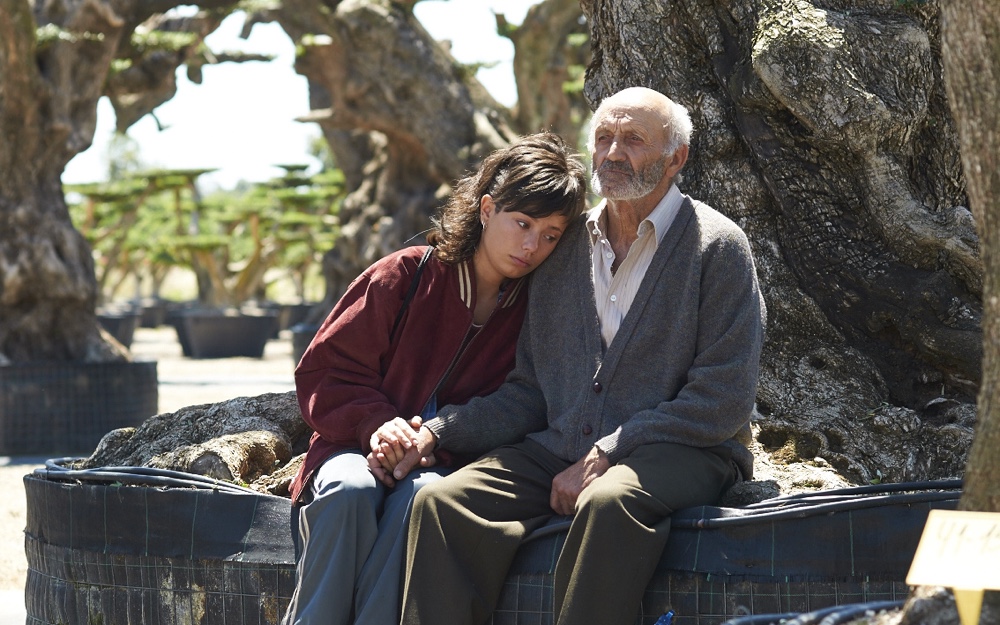The Olive Tree
Nov 23, 2017 - 19:30 - Corn Exchange
- Director: Iciar Bollain
- Year: 2017
- Country: Spain
- Run Time: 100 mins
- Ratings
- A: 78
- B: 37
- C: 11
- D: 3
- E: 1
- Overall: 86

A deceptively simple drama about a family and its thousand-year-old olive tree that is rooted in the best cinematic soil there is — emotional truth — The Olive Tree gets its hooks in early on, and then never lets up. Combining social crit with a deeply human story about the broken and unbroken bonds between generations, this yarn about a young Spanish woman’s literal and spiritual quest to recover a symbolically significant olive tree from its new corporate owners is, like the best work of Bollain, co-scriptwriter Paul Laverty and their colleague and mentor Ken Loach, cinema that cares and wants to make the world better. In Spain at least, sadly it’s an increasingly rare subgenre. Tree's raw human appeal has generated healthy pre-release sales across a range of territories, as well as recent festival play in Miami and Guadalajara: Word of mouth could see it blossom into extended international art house runs. The family of impulsive Alba (Anna Castillo) has fallen on hard times, and they’ve been forced into abandoning olive oil production for poultry farming. On the personal side too, the tensions are running high: Bad business decisions have been made, Alba’s uncle (Arti), embittered but kind-hearted, is unemployed and her grandfather (Manuel Cucala, a local man who has never acted before, and whose authenticity cannot quite be matched by the pros) wanders in hermetic silence around the lands in scenes visually redolent of Erice’s masterpiece The Spirit of the Beehive, piling up stones where his and Alba’s favorite olive tree used to stand, before being uprooted (in one of the films emotionally punchy flashbacks) and sold, the money going to set up a beach restaurant that has now gone bust, a victim of the financial crisis. The magnificently gnarled tree, in the film’s defining trope, has been sold to a German energy company that is now using is as their logo: It’s a smart, sharp comment on our current moral crisis, in which marketing swiftly co-opts values. "He’s gone, Alba," her father (Miguel Angel Aladren) poignantly tells her with reference to her grandfather, but Alba is determined to bring him back. ‘I know you’re there,’ she tells him, and promises to bring the tree back to Castellon. For the benefit of the locals she fakes a letter from a German pastor who has promised to return the tree, so it will simply be a case of borrowing a truck and driving to Dusseldorf to get it. She enlists the reluctant help of Arti and the not-so reluctant help of Rafa (Pep Ambros), who has a crush on her, and off they go. Communities are important to Bollain and Laverty, and they borrow to strong effect from Laverty and Loach the technique of mixing pros and locals in wryly comic group scenes, in this case centered on the local bar, which is full of unemployed men. But, the film reminds us, other, Internet-based communities are arising to replace them, and Alba’s quest quickly becomes the focus of a social media protest campaign against the German energy company. There will be a catharsis for some Spaniards in all this, given the widespread feeling that it’s the Germans who have assumed control of the Spanish economy. It is easy for films like this to wear their political hearts too obviously on their sleeves (and this was an issue with Bollain and Laverty'’s 2010 feature, Even the Rain), but the social crit here is not laid on forbiddingly thickly, filtered as it is through these engaging characters. Phrases often heard throughout Spain during the (ongoing) crisis pop up — ‘the whole country has been deceiving itself’, says Arti, which makes the film in part a commentary on that crisis and on their mass exile (an issue dealt with in Bollain’s last film, the Spaniards-in-Scotland documentary In a Foreign Land). Perhaps the only false note is the pompous fiberglass model of the Statute of Liberty, which Arti steals from the house of a wealthy man who owes him money and attaches to the back of the truck. Later, it too obviously becomes the symbolic target of Arti’s working-man frustrations. Flashbacks are used subtly and to potent emotional effect to establish the emotional bonds on which the film depends for its meaning, whether it’s the child Alba putting makeup on her grandfather’s face (this is also a film about the vast gulf, in a country which has changed so rapidly over the last 40 years, which separates the elderly from their grandchildren), or the 10-year old Alba defiantly climbing the ancient olive tree as the bulldozers move in (incidentally, and logically, no olive trees were harmed during the making of this movie). The performances are uniformly strong, and therefore the all-important dynamics between the characters. Castillo is convincing as the healthily spiky Alba, a young woman guided by her emotions and a powerful sense of injustice, but this is equally a film about the recent injustices meted out to the working man, here represented by the tightly-wound Arti. Gutierrez, who delivered one of 2014’s finest performances in the Alberto Rodriguez's multiple award-winning Marshland, is equally nuanced, bristling and committed here as the too-open-hearted Arti. He's also responsible for much of the film’s sly, self-mocking humor. Pascal Gaigne’s gentle orchestral score, like the film as a whole, skillfully negotiates the tightrope between sentimentality and authentic emotion. Sergi Gallardo’s widescreen photography is as unfussily effective in its documentary-style hand-held scenes as it is when it is soaring over the stunning ochre landscapes of eastern Spain. Jonathan Holland hollywoodreporter.com